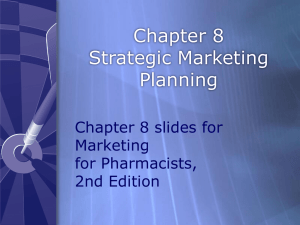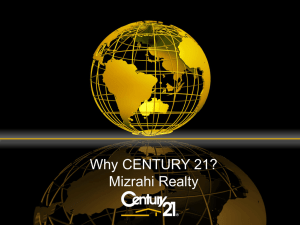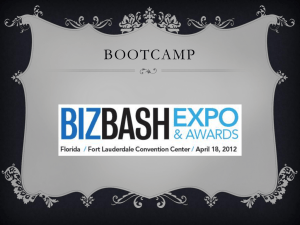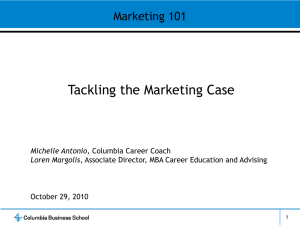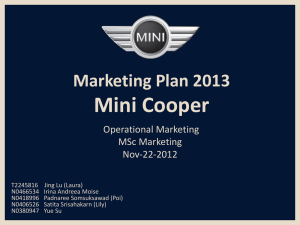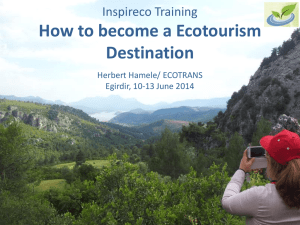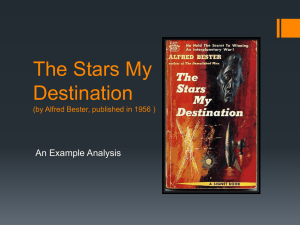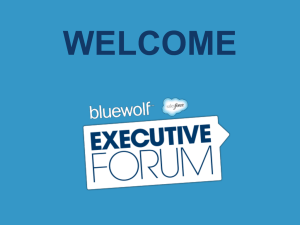CNN TASK
advertisement
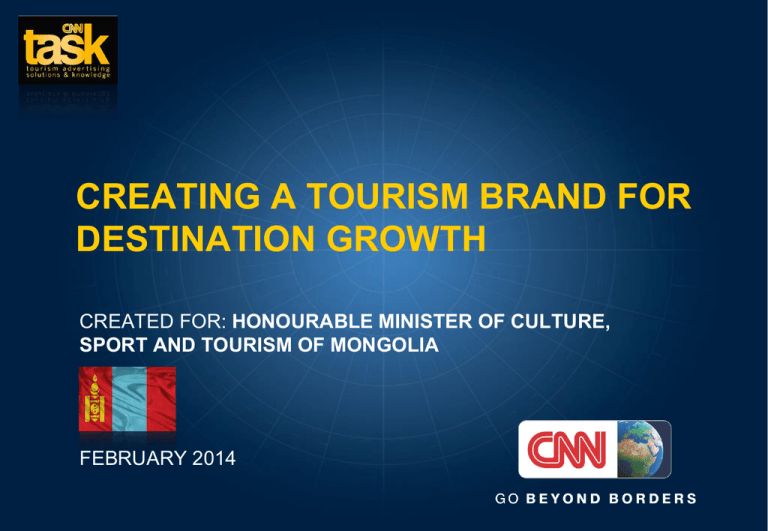
CREATING A TOURISM BRAND FOR DESTINATION GROWTH CREATED FOR: HONOURABLE MINISTER OF CULTURE, SPORT AND TOURISM OF MONGOLIA FEBRUARY 2014 CONTENTS PART 1: What is Destination Branding? PART 2: Brand Development PART 3: Identifying a Proposition for Destination MONGOLIA PART 4: Recommended Way Forward TRAVEL & TOURISM - OVERVIEW Each and every day, more people are travelling that ever before. In 2012, the milestone of 1 BILLION International Arrivals was reached. In 2013, the number grew to 1.082 million. TRAVEL & TOURISM – OVERVIEW (CNTD) Travel & Tourism has become the 3RD BIGGEST economic sector, responsible for: • 1 in 11 jobs worldwide • US$ 6.6 Trillion in GDP • 9% of global investment TRAVEL & TOURISM – OVERVIEW (CNTD) Travel & Tourism is also vital for the development of nations in terms of: • Identity • Differentiation • Competitiveness THE IMPORTANCE OF THE BRAND • For any destination, central to tourism sector growth and development is the establishment of a: – creative, – compelling, – consistently applied, and – competitive, BRAND. PRINCIPLES OF DESTINATION BRANDING • A Destination BRAND is a clear, concise, carefully crafted expression of the: – Name – Characteristics – Quality – Unique promise of a travel destination. WHO DESTINATION BRANDS SPEAK TO The destination BRAND speaks to 2 key AUDIENCES: 1. TRAVELLERS to the destination 2. RESIDENTS of the destination. & SPEAKING TO THE TRAVELLER • For Tourists the Destination BRAND acts as a source of identification of not only the destination name, it is a reflection of the destination’s character and PROMISE of the traveler experience: – the beauty and intrigue of places to be seen, – the cultural pageantry of people to be met, – the range of local activity to become a part of, – the spirit of the destination to be felt. • … an encapsulation of the unique experiences which the tourism can come ‘touch’ for themselves. SPEAKING TO THE RESIDENTS • For the People of the Destination the BRAND represents a symbol of the destination’s DNA - a unifying force, aligning all of the people of the destination behind all that it has to celebrate in its: • Culture • Spirit • Personality • Future aspirations …inspiring the people of the destination to become hosts of visitors to their destination, be they formally a part of the tourism industry or simply because they call the destination ‘home’. BRANDS SPEAKING CLEARLY Ultimately the BRAND acts as the VOICE of the nation - a vital source of IDENTITY and MESSAGING for the destination. V - VISION V O I C E – VISION Expressing the destination’s: • IDENTITY - as a place and people of possibility • INFORMATION - key to visitor attraction and decision making • INSIGHTS - around the destination’s spirit and offering • INVITATION - welcoming travellers to come, see, feel and enjoy the destination O - ORIGINALITY V O I C E – ORIGINALITY Showcasing the destination’s uniqueness in: • OFFERINGS: Places, Attractions, Experiences • SPIRIT: Culture, Pride • IDENTIFIERS: Images, Sounds, Look & Feel I - ICONIC V O I C E – ICONIC Features of the destination - ie. natural environments, structures, people, wildlife, , events, sport, elements of arts and culture - which are: • SYMBOLIC • MEMORABLE • OWNABLE • MEANINGFUL • INSPIRATIONAL C - COMPETITIVE V O I C E – COMPETITIVE Ability to stand out and capture traveller interest through: • MESSAGES • MEDIA • MOMENTUM E - EXPERIENTIAL V O I C E – EXPERIENTIAL Opportunities for travellers to engage with, and truly feel, the destination’s: • PEOPLE • CULTURE • WAY OF LIFE • DEVELOPMENT BRANDS SPEAKING TO BE HEARD • The development of a destination BRAND is the 1st step towards building tourism arrivals, and the desired impact on the economy, society and long-term stability of the nation. • The 2nd step is developing a well thought through communications strategy, one that invests in: • Brand awareness building • Expression of invitation from the destination to travellers • Establishing and sustaining destination interest • Inspiring traveller booking • The 3rd step is making the long-term investment in consistent Brand presence through marketing and promotion.. BRANDS SPEAKING TO BE HEARD (CNTD) STEP 1: Develop the BRAND STEP 2: Define the COMMUNICATIONS Strategy STEP 3: Establish Ongoing MARKETING Presence • The Logo • The Audiences • The Right Partners • The Imagery • The Goals • The Budgets • The Key Words • The Platforms • The Leverage • The Music • The Budget • The Metrics • The Invitation • The Long-Term CONTENTS PART 1: What is Destination Branding? PART 2: Brand Development PART 3: Identifying a Proposition for Destination MONGOLIA PART 4: Recommended Way Forward BRAND DEVELOPMENT Destination branding has become very competitive, all across the globe, as nations realise that the brand is the hook to attracting tourists, and therefore stimulating economic impact. BREAK-THROUGH requires: • More than postcard images • Unique message (brand) and messenger (media) • Emotional connection • Believability • Creativity, not cleverness • Strong marketing and advertising strategy support IMPORTANT TO ASK BEFORE BRAND DEVELOPMENT • WHAT understanding is there of the destination? • As a nation • As a tourism destination • Is it Correct? Is it Incorrect? What needs to be shifted? • WHO are we trying to reach? • Business or Leisure? • Young or Old? • Active or passive visitors? • Regional or International? IMPORTANT TO ASK BEFORE BRAND DEVELOPMENT (CNTD) And of course: • WHERE is competition coming from? • Regionally? • Internationally? • Perceptually? • Emotionally? • Seasonally? BRAND DEVELOPMENT STEP 1: Develop the BRAND • The Logo • The Imagery • The Key Words • The Music • The Invitation Development of a destination Brand requires working through the selection of, and commitment to, a number of elements. Each of these elements shapes the overall awareness, identity, interest and recall for the destination. Importantly, they build a relationship with audiences which must be carefully nurtured to ensure trust, loyalty and preference. DESTINATION BRAND: CHECK LIST 1. BRAND DNA 2. ICONOGRAPHY 3. STORYTELLING 4. EMOTIONAL PULL 5. INVITATION Building on the BRAND BRAND DNA: COLOUR PALETTE BRAND DNA: FONT BRAND DNA: MUSIC BRAND DNA: WORDS INDIA: Incredible • http://www.youtube.com/watch?v=VUFg-ujVqMI KENYA: Magical • http://www.youtube.com/watch?v=3Z5Mv-R4Jl8 PLEASE BEWARE! • Postcard ads • Cultural Humour • Marketing and advertising the region vs the destination • Generic Messages: • ‘Culture’ • ‘Warm, friendly people’ • Overused language: • ‘Experience(s)’ FINAL CHECK Is the Destination BRAND: • Truly unique? • Can you own it? • Memorable? • Strategic or Tactical? • Messaging for the short-term or long-term? • Going to be supported with consistent exposure? CONTENTS PART 1: What is Destination Branding? PART 2: Brand Development PART 3: Identifying a Proposition for Destination MONGOLIA PART 4: Recommended Way Forward MONGOLIA AS A COMPETITIVE OFFERING The nation of Mongolia has emerged as a travel destination offering a new, fresh, compelling alternative to other locations across the world. Being a young travel offering on the global tourism map, Mongolia is relatively unknown, unexplored and undeveloped. This has resulted in Mongolia having within its offering an innate mystique. For travellers seeking new horizons – destinations that offer purity of natural environment, richness of indigenous wildlife, an array of outdoor activities from trekking and horseback and camel riding to bird watching, rafting and fossil hunting - Mongolia is blessed with numerous competitive options, over and above its richness of culture, history, heritage and hospitality.. MONGOLIA AS A COMPETITIVE OFFERING (CNTD) In addition, Mongolia is committed to ensuring that the destination stays tore to its roots in proactively responsible tourism development. This approach is serving the destination well to protect it from unstructured, over-growth to the detriment of the nation, and travel experience. DESTINATION ELEMENTS For all that it has to offer, for effective, competitive brand development Mongolia must look carefully at what it puts forward as its reasons to visit. Within the numerous attributes of Mongolia for tourists, a separation is required between what is generic – what any destination can offer, and what is truly unique to Mongolia. GENERIC • Nature • Space • Freedom • Unique culture • Experience • Adventure • Friendly people UNIQUELY MONGOLIA • Living nomadic lifestyle • Rich history and heritage • Ancient discoveries to this day • Land & man in harmony • Equestrian culture • Vast openness • Innate, proud connection to nature CURRENT BRAND EVALUATION The destination brand approved for Mongolia in 2013 has provided the destination with an important vehicle for invitation to travellers. The slogan selected: “Go Nomadic, Experience Mongolia”, provided a valuable first step for competitive differentiation. Looking forward, the Ministry of Culture, Sport and Tourism seeks to establish a new brand for Mongolia to be its ‘voice’ on the international tourism stage, starting with the destination’s prestigious partner sponsor starts at ITB 2015 in Berlin. With this in mind, CNN and CNN TASK, as a partner committed to the growth and success of Mongolia, has conducted a rigorous brand review of the current destination brand as a basis for proposing a new brand offering for Mongolia for the long term. CURRENT POSITIONING: OUTCOME OF REVIEW The current destination brand has seeds of strength within its statement of offering and call to action. However, the generic elements of the slogan eclipse the brand’s appeal. Call to Action, overt but not personal. Direction outwards is not inviting. “Go Nomadic, Experience Mongolia” Invitation, but too generic Important anchor of the brand pay-off line ADVANCING THE BRAND To slogan strengthen the current brand, it is strongly recommended that the theme of the innate unique properties of the brand not be lost. To introduce a completely new brand language would not only cause confusion to audiences, it would lose what value was in hand. The challenge, and therefore opportunity, of the brand is to: • Eliminate generic elements • Strengthen unique elements • Introduce elements that make a natural link to competitive attributes of the destination • Give the brand an energy of character and invitation The next step is, therefore, to look at what is missing? ADVANCING THE BRAND (CNTD) Absent from the current brand expression are the following unique aspects of Mongolia: • Living nomadic lifestyle • Rich history and heritage • Ancient discoveries to this day • Land & man in harmony • Equestrian culture • Vast openness • Innate, proud connection to nature From this challenge of ‘what is missing’ we find the opportunity for the new brand RECOMMENDED POSITIONING Based on: •The comprehensive briefing received from Mongolia’s Ministry of Culture, Sport and Tourism •Examination of source material supplied by the Ministry, and further mined through research] •TASK global review of destination brands •Analysis of the current tourism brand for Mongolia •Reflection on initial discussion with the Honourable Minister of Ministry of Culture, Sport and Tourism in Zambia in 2013 regarding the innate value system and development structure of Mongolia’s tourism industry, the following new brand positioning is recommended for Mongolia… RECOMMENDED POSITIONING (CNTD) Maintaining link to existing awareness of identity. Link to enduring nomadic lifestyle and mindsets…as well as natural magnificence of the land itself “Nomadic by Nature. Discover Mongolia” Links to People, History, Paleontology, Culture, Art, Events, Natural Environment, Wildlife, Adventure, etc. Maintaining call-out of destination name CREATIVE CONSIDERATIONS – SLOGAN VARIATIONS The proposed brand positioning can be applied in two versions,: 1)Full “Nomadic by Nature. Discover Mongolia” 2)Shortened “Mongolia. Nomadic by Nature.” Both versions effectively convey the destination message and invitation, while maintaining a link to the core proposition of the brand. RECOMMENDED POSITIONING (CNTD) This evolved brand positioning has the following, highly competitive strengths : •Reflects the genuine strengths for Mongolia as: • A nation • A people • A travel choice •Speaks to a specific type of traveller that Mongolia seeks to attract: • People who are adventurous, explorers, psychologically ‘nomadic by nature’ • Appreciate living cultures RECOMMENDED POSITIONING (CNTD) And critically: • Is very campaignable: • Can be used to showcase (via specific executions/vignettes/ads) specific offerings: events, adventure, culture, history, sport, nature • Is true to Mongolia as: • A nation • A people • Is highly competitive: • Reflecting a travel choice seen nowhere else in the world • Allowing for stand-out CREATIVE CONSIDERATIONS – THE ‘DNA’ From a creative perspective, the look and feel of the new brand for Mongolia would best be brought to life through: COLOUR PALETTE • Earth-tones SOUND • Outdoor, gentle breeze • Distant sounds of local musical instrument • Male voiceovers SCRIPT • Hand brushstroke, not computer generated text ESSENTIAL TO BRAND SUCCESS • As outlined earlier, having a strong brand is only part of the process of destination branding. • Creating brand awareness, and destination interest, is vital. ESSENTIAL TO BRAND SUCCESS • For destinations, marketing and advertising has become a vital part of building not just awareness and bookings, but also reputation and status. • Importantly, brand based advertising has evolved to be seen as an essential investment in tourism growth, not simply an expenditure. • When used effectively, marketing and advertising becomes the heartbeat of current and future destination survival and growth. • When understood fully, the role of marketing and advertising at strategic and tactical levels is proven invaluable. • When not understood, more damage can be done to the Brand, and the traveller’s interest, than good. LAYERS OF IMPACT • Destinations investing in media experience layers of impact. – Overtly, marketing and advertising provides the push, reaching out to audiences to attract awareness, build interest, create desire and stimulate action. – Covertly, and very importantly, marketing and advertising also sends out a message to audiences that the destination advertising is a serious player, one that recognises the importance of getting their message out. The result is the building of respect, confidence, trust and interest in the advertiser. • These layers which are vital to the stability and profitability of nations. • Together, overt and covert messages coming through marketing and advertising influence bookings, brand development, image enhancement, future interest and traveller loyalty - all which work to strengthen destination competitiveness. INVESTING IN CONTINUOUS ADVERTISING • Keeping the brand visible through advertising acts as a vital aspect of strategic brand development as this is a leading ‘voice’ for the brand. • Duration of advertising plays a powerful role in the ability of destinations to create the desired impact. • When advertising is short-term, the ability of the message to break through, gain awareness and create the desired response of audiences is reduced to a short/limited period of time. • Reason being, like all communication, limited exposure to messaging causes limited retention. • Continuous advertising has the net effect of increasing impact for the long-term. The more enduring the more penetrating. • Repetition creates greater recall. THE VITAL ROLE OF BRAND CONSISTENCY • Understanding, awareness, believability, credibility and longevity of the Brand and its media is more important in some sectors than other. • Importance depends on the perceived sense of risk and/or reward of the booking on the part of the consumer. • Tourism is one of those sectors, as when a traveller decides to visit a place, they are investing at several levels: – Money – Time – Hopes & Dreams • The investment is only seen as ‘safe’ if the message (Brand) and messenger (media platform) can be trusted by the potential traveller. LEADING BRANDS, LONG-TERM COMMITMENT • Consistency in brand message attracts, and sustains, the interest of travellers, growing their desire to take the step of making the booking. • This has been seen in a number of leading destinations brands with brand usage now over a decade old. • While the brand has remained the same, executions have simply been refreshed. THE RISK OF INCONSISTENCY OF BRAND • For this reason, to frequently change the destination brand and/or its media approach is to dangerously chip away at traveller trust, interest and investment. While the desire to change a brand and its media activity is a natural temptation, the risks must be calculated. • As has been seen in even strong tourism destinations such as GREECE with over 4 campaigns in a period less than 10 years, continuous change of the brand causes confusion around what exactly the offering is, and how stable the destination is for experience delivery: “Experience” + “Senses” + “Myth” + “Kalimera” CONTENTS PART 1: What is Destination Branding? PART 2: Brand Development PART 3: Identifying a Proposition for Destination MONGOLIA PART 4: Recommended Way Forward NEXT STEPS Noting the priorities and timelines of Mongolia’s Ministry of Culture, Sport and Tourism, the following next steps have been pre-agreed in discussion between the Ministry, CNN and CNN TASK: •By February 03rd, 2014: CNN TASK submission of recommended new brand positioning •By February 17th, 2014: feedback from Ministry on brand go-ahead •For March 05th, 2014: CNN TASK development of briefing document for ITB team for 2015 brand activation •At ITB 2014: Ministry, CNN, CNN TASK and ITB team meeting in preparation for 2015 partnerships THANK YOU FOR FURTHER INFORMATION PLEASE CONTACT: CNNTASK@TURNER.COM

